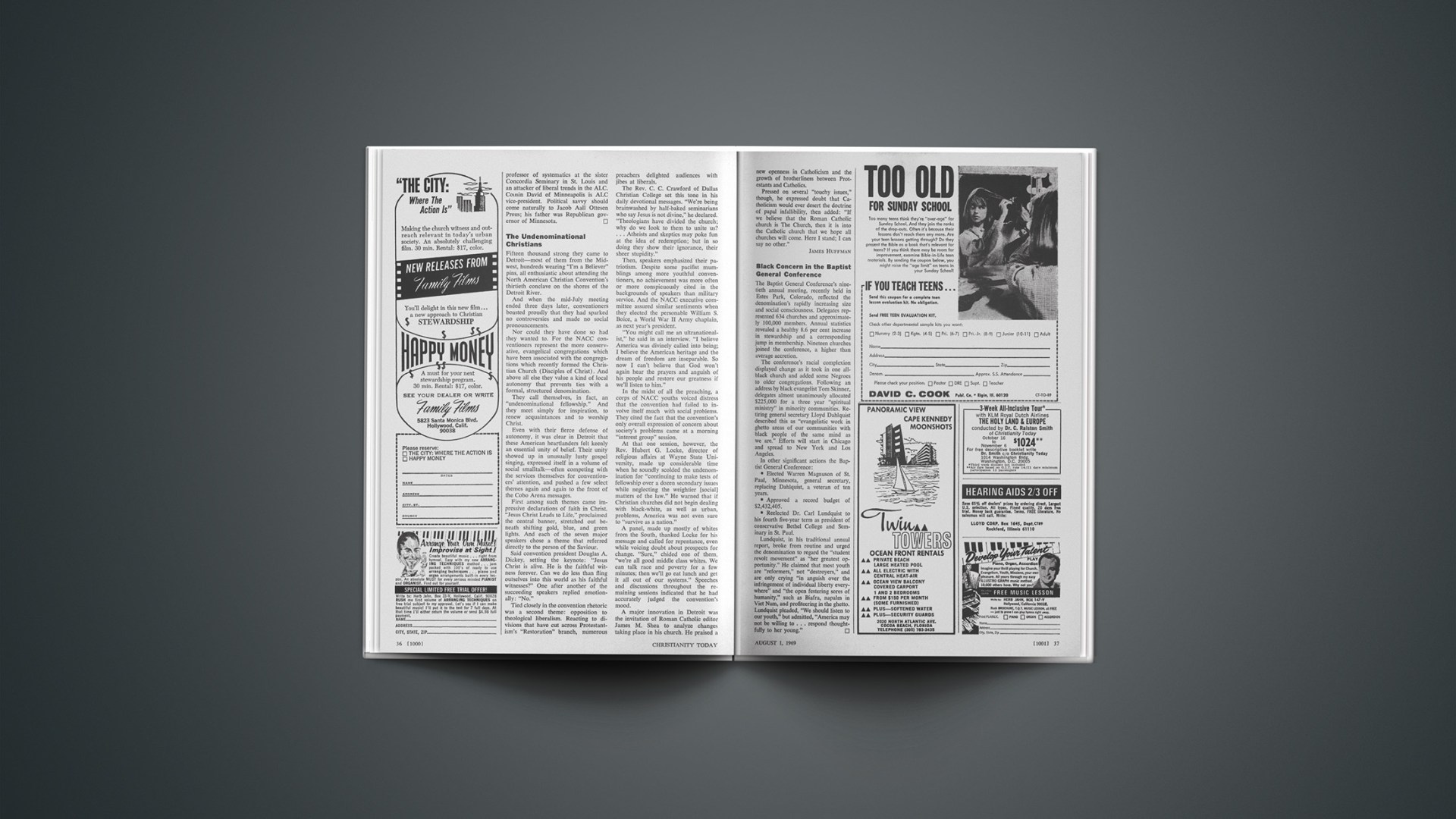On Sunday, July 20, 1969, man first set foot in the heavens. Buoyed by the prayers, hopes, and determination of millions around the world, two American astronauts with Christian upbringing landed safely on the moon’s Sea of Tranquility.
It was possibly the most prayed-for event in human history, and the intercession continued as the astronauts headed back to earth.
From a Christian perspective, the absence of explicitly spiritual acknowledgements disappointed many. The late President Kennedy had publicly asked God’s blessing on the American effort to reach the moon. God did bless the venture, but there was no immediate recognition of that fact or any utterance of thanksgiving for it, either from the astronauts on the moon or from President Nixon in his earth-to-moon telephone call.
Neil Armstrong, the civilian commander of the Apollo 11 flight, said on becoming the first human being in recorded history to walk on the moon, “That’s one small step for man, one giant leap for mankind.” The humanistic overtones of the statement will be debated in ecclesiastical and theological circles for many years.
Armstrong grew up in an Ohio Evangelical Reformed church which is now part of the United Church of Christ. But he has shunned churches in his adult life. Prior to leaving for the moon, however, he told a television audience that he was thankful for all the prayers in behalf of the mission. His gratitude was later seconded by his mother, whose reaction to the manned lunar landing was a hearty “Praise God from whom all blessings flow.”
Edwin Aldrin, the second lunar pedestrian, showed that he takes his faith seriously. He carried along in the Columbia-Eagle spacecraft a morsel of communion bread which he ate while on the moon. Aldrin is an active United Presbyterian churchman whose fellow parishioners were taking communion the same day. He radioed a request to “every person listening in … to contemplate the events of the past few hours and to give thanks in his or her own way.”
Some Christians hoped that the pair’s activities on the moon would include something of special religious significance that was not readily apparent but would be divulged later.
Landing on a Sunday helped give something of a religious tone to the occasion. Among special observances was a White House service in which Apollo 8 commander Frank Borman read the first ten verses of Genesis as he had while orbiting the moon last Christmas Eve. Thousands of ministers built sermons around the moon theme. Many put touches of humor in their topic announcements with titles like “God and Green Cheese” and “A Funny Thing Happened to Me on the Way to Heaven.”
Pope Paul VI guaranteed that Holy Scripture would go to the moon with man’s first visit there when he quoted Psalm 8 as part of a recorded message to be left on the lunar surface. The pontiff’s message was one of a number from world leaders that were carried to the moon by the Apollo 11 astronauts. The official message from the United States was on a plaque attached to the descent stage of the lunar module. It reads: “Here men from the planet Earth / First set foot upon the moon. / July 1969 A.D. / We came in peace for all mankind.” The plaque was signed by Nixon and the Apollo 11 astronauts.
Nixon, in proclaiming a national holiday in honor of the event, had predicted that the first footfall on the moon would be a “moment of transcendent drama” for millions of people. He was proved right as people around the world hailed the event. The Soviet Union also won a measure of praise by landing its Luna 15 spacecraft on the moon the next day.
Much of what opposition was expressed came from ecclesiastical circles. The most common argument: Expenditures for space effort should be channeled instead into improving the lot of the underprivileged. Marshall McLuhan tried to squelch that argument by pointing out that the $24 billion spent to put man on the moon is the same amount spent by Americans on alcoholic beverages every year.
The manned lunar landing already has begun to open up discussion of the ideological implications of space exploration. Particularly significant is the fact that the moon landing came at a time when the Church is in considerable ferment. Religion Editor Edward B. Fiske of The New York Times said the event will probably intensify unrest. He contended that it can be expected “to accelerate the trend already under way among theologians toward increased respect for man’s capabilities in relation to God. It could also contribute to the undermining of traditional authority and increase the receptivity of the man in the pew to doctrinal change.”
Religion Editor Dan L. Thrapp of The Los Angeles Times sees a profound theological re-orientation as a result of Apollo 11. “While not overturning a single ‘ultimate truth’ contained in Scripture, the development still will prove numerous theologians false,” he said. Thrapp expects that discovery of life on some extraterrestrial body will cause “modification in the way man comprehends the man-God relationship.”
Billy Graham told a This Week interviewer that he believes “there are hints in the Bible of life on other planets.” But few other Christian leaders have spoken out on the subject.
Whether or not an “astro-theology” is developed that compels men to consider authentic Christianity more seriously depends largely upon the Church’s willingness to foster Scripturally oriented interdisciplinary study. Hopefully, a vanguard of thinking evangelicals interested in the space program will get the jump on theological and philosophical speculators. The main issue is whether man through the marvels of technology is perfectable, or through the miracle of Christ’s atonement is redeemable.










